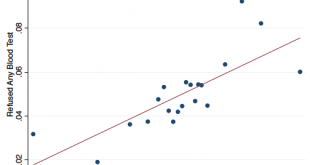The rest of the Jack Ryan pilot is 45 minutes of talking about clustering standard errors David McKenzie has a nice post and discussion on descriptive studies in development. In his back and forth with Lant in the comments he mentions the count of how many development econ studies in 14 journals in 2015 were RCTs (9.7%). Google introduced a data set search, which trawls for publicly available data sets, similarly to how Google Scholar works. Here they describe how it works and how to...
Read More »IPA’s weekly links
Guest post by Jeff Mosenkis of Innovations for Poverty Action. This blog’s landlord, Chris Blattman, was on the Economic Rockstar podcast talking about Crime, Cocaine, Chicago Gangs, and the Colombia Mafia. (iTunes) And if you liked those projects, IPA has a job posting to work on projects like those with Chris and others in Colombia. This was fun – the Development Aid Project Jargon-ator is supposed to come up with nonsense development project titles, but so far all of mine sound pretty...
Read More »IPA’s weekly links
Guest post by Jeff Mosenkis of Innovations for Poverty Action. Snot corn! That’s crop scientist Sarah Taber’s nickname for the variety of maize native Mexicans cultivated that allowed it to grow very high in very poor soil. According to a genetic sequencing published by UC Davis researchers, the secret is in the mucus-like goop around roots that are out in the open. The bacteria in the goop allow the plant to fix nitrogen from the atmosphere, effectively fertilizing itself from the air....
Read More »IPA’s weekly links
Guest post by Jeff Mosenkis of Innovations for Poverty Action. If you can get past me at the beginning, this Planet Money episode The Poop Cartels (Apple/iTunes link), I think shows the power of good econ theory put into practice. Molly Lipscomb of the University of Virginia explains how she, with Laura Schechter, and a big research team in Senegal tried to introduce what some people have also called the “Uber for Poop.” Peter Biar Ajak is a former Sudanese “lost boy” who went on to train...
Read More »IPA’s weekly links
Guest post by Jeff Mosenkis of Innovations for Poverty Action. My colleague Rebecca Rouse guest edits today’s faiV newsletter from NYU’s Financial Access Initiative (you can subscribe for a weekly dose of financial inclusion news). Spectacular job opportunity from the International Rescue Committee working with NYU and Sesame Workshop, leading M&E on their MacArthur $100 Million-winning project to help war-affected kids. Alaka Holla picks up the question of whether we should give up on...
Read More »IPA’s weekly links
Guest post by Jeff Mosenkis of Innovations for Poverty Action. Petronia (above), an online course and game from the National Resource Governance Institute, lets users run a fictional country where oil is discovered to see if they can avoid the resource curse. (h/t David Batcheck) From the Stata journal– A new command, baselinetable, creates handy summary stats tables for your baseline reports to make sharing your findings much easier. It exports to Stata, Excel, CSV, etc to make it really...
Read More »IPA’s weekly links
Guest post by Jeff Mosenkis of Innovations for Poverty Action. A nicely designed and helpful media guide for researchers on how to prepare for interviews with journalists, based on a survey of science writers. It’s divided into before, during, and after the interview and gives concrete advice about what to expect and do in each. Having two women on a board of directors appears to be the new having one woman on a board of directors. With “tokenism” becoming more obvious, Chang, Milkman,...
Read More »IPA’s weekly links
Guest post by Jeff Mosenkis of Innovations for Poverty Action. “Back in school we used to call it chew and pour,” he says. Meaning, for each possible question, the teacher gives you one correct answer to memorize — or “chew” — so that come test time, you can regurgitate it — “pour it” back to her verbatim. “And then,” adds Agbavor with a chuckle, “you forget about it. Nothing is retained.” That’s from one of my favorite podcasts, NPR’s Rough Translation, which is hosted by their former...
Read More »IPA’s weekly links
Guest post by Jeff Mosenkis of Innovations for Poverty Action. We show that this East-West difference is due to girls’ attitudes, confidence and competitiveness in math, and not to other confounding factors, such as the difference in economic conditions or teaching styles across the former political border. (via Lisa Cook) Jobs: Richard Thaler writes about the evolution of behavioral economics in AER. (Gated, but you can watch him explain it in his Nobel lecture version and slides). ...
Read More »IPA’s weekly links
Guest Post by Jeff Mosenkis of Innovations for Poverty Action. Alex Tabarrok summarizes the story from the new book on RCTs, Randomistas, about how TOMS shoes invited an external evaluation of their program giving away shoes and discovered it wasn’t helping recipients very much. This isn’t that unusual in development, but faced with the evidence, they agreed to be named in the paper and be public about it, and tried to figure out how to use the insights to do better. (See study author Bruce...
Read More » Chris Blattman
Chris Blattman






